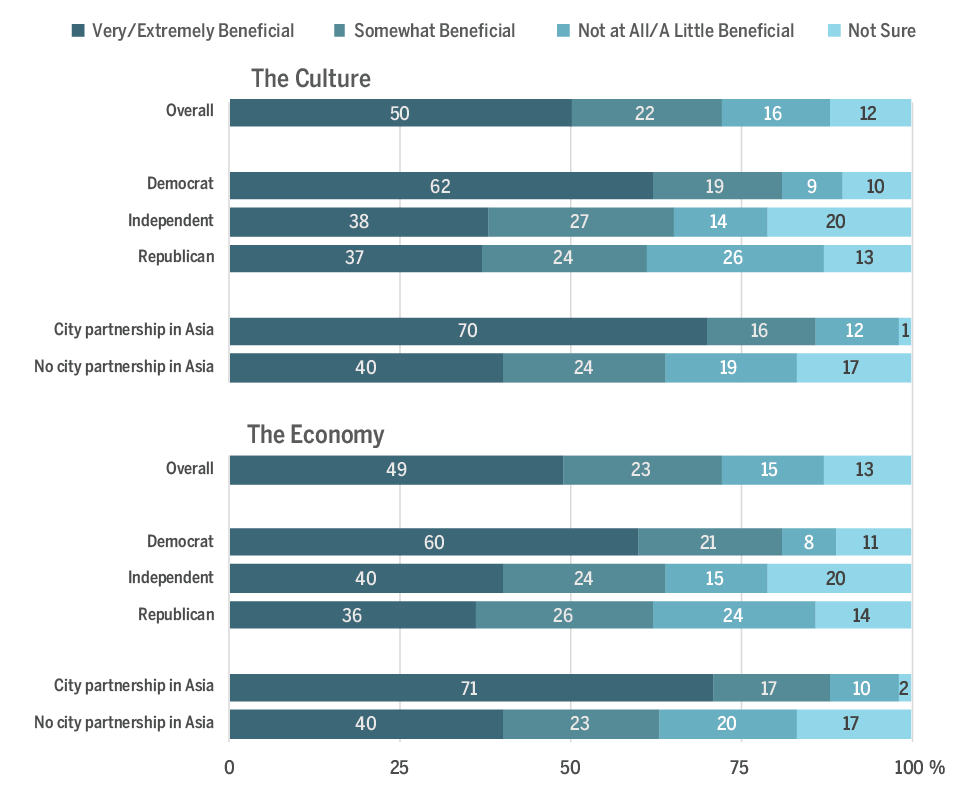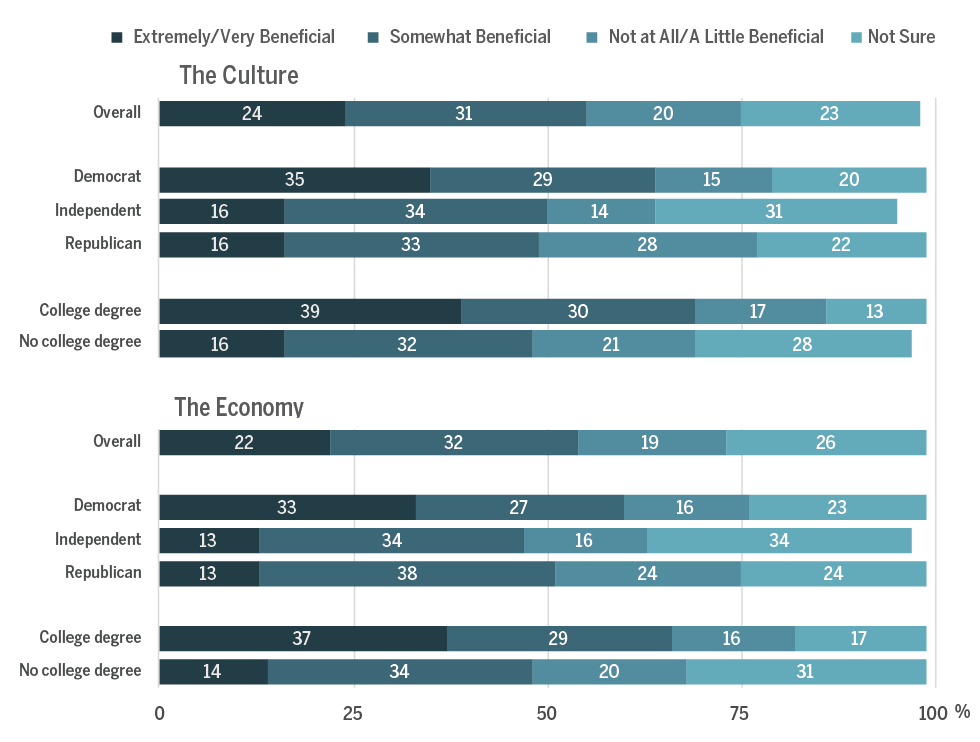The following article is part of an ongoing series of analyses based on the recent Asia Matters for America Public and Elite Opinion poll. See all articles in the series here.
In December 2021, a poll conducted by NORC at the University of Chicago on behalf of the East-West Center outlined how Americans view US-Asia relations in various topics. Among the surveyed questions, the general population and elites* were asked how they perceived international students from Asia and their impact on the local culture and economy. The data shows most respondents (72% of elites and over 50% of the general population) believed students from Asia were extremely/very beneficial or somewhat beneficial. The biggest gap in opinion was between elites and the general population and between Democrats and Republicans.
Among elites, a majority responded that Asian international students were somewhat beneficial or extremely beneficial for their state’s culture (72%) and economy (72%). Nearly half were overwhelmingly favorable and perceived international students to be extremely/very beneficial for both culture and the economy. On the other hand, less respondents from the general population believed international students were at least somewhat beneficial for their state’s culture (55%) and economy (54%).
HOW BENEFICIAL IS THE PRESENCE OF STUDENTS FROM ASIA FOR EACH OF THE FOLLOWING FOR UNIVERSITIES AND SURROUNDING COMMUNITIES IN YOUR STATE?
Percent of Elites*

The other gap between surveyed groups was by political parties. Democrats in both elites and the general population were more likely to respond favorably to Asian international students. In the general population, over 30% of Democrats responded the presence of students from Asia had an extremely/very beneficial effect on their local culture and economy. On the other hand, only 13% and 16% of Republicans responded with extremely/very beneficial for the impact on culture and economy, respectively. This discrepancy is also seen in elites. Over 60% of Democrat elites responded with extremely/very beneficial for both the culture and economy, while roughly 40% of Republicans responded in the same way. Furthermore, Republicans in both survey groups were more likely to respond with not at all/a little beneficial compared to Democrats. Although Republican elites are more likely to respond favorably than Republicans in the general population, the gap between Democrats and Republicans existed in both surveyed groups (elites and the general population).
HOW BENEFICIAL IS THE PRESENCE OF STUDENTS FROM ASIA FOR EACH OF THE FOLLOWING FOR UNIVERSITIES AND SURROUNDING COMMUNITIES IN YOUR STATE?
** Percent of Adults

Other factors also appear to affect the perception of Americans towards Asian international students. Those with a college degree in the general population were more likely to view Asian international students as having a positive effect. For example, 37% of respondents with a college degree answered Asian international students were extremely/very beneficial. On the other hand, only 14% of those without a college degree responded favorably. Among the surveyed elites, a city partnership in Asia positively affected their perspective towards Asian international students. A majority (71%) of elite respondents with a city partnership in Asia responded with extremely/very beneficial, while 40% of those without a city partnership responded the same.
How respondents answered other questions about Asia and Asian-Americans was connected to their opinion on Asian international students. Those who indicated Asian-Americans generally share the same values as they do were more likely to respond favorably towards Asian international students. Over 60% of the general population and roughly 75% of elites who believe they have shared values with Asian-Americans responded the presence of Asian international students was at least somewhat beneficial. This correlation is also present for the question of if Asia matters to their state. Roughly 40% of the general population who believed Asia matters for their state responded Asian international students were extremely/very beneficial, while less than 20% responded the same if they believed Asia did not matter for their state. Among the elites surveyed, over 60% of those who believed Asia matters to their state also responded with extremely/very beneficial towards international students. In comparison, elites who did not believe Asia matters to their state were less likely to reflect this perception, with roughly 30% responding the same about Asian international students.
The data presents two possible implications. First, it reveals elites and the general population perceive Asian international students differently. Elites, whether they serve in business or the public sector, may be more exposed to Asian customers and the positive impacts of large international student populations. Second, the data shows political affiliation impacts the perception of these students and their benefit to the community. This may be because the question of Asian international students also connects to other questions such as how Americans think about race and immigration.
Jae Chang was a former East-West Center in Washington Young Professional. He is a recent graduate of Cornell University, where he studied Government and China & Asia-Pacific Studies.
Asia Matters for America Poll Analysis is a series of short articles exploring the results of the recent survey by the East-West Center and conducted by the NORC at the University of Chicago on American perspectives on US-Asia relations. Authors examine a segment of the results from the report regarding trade, tourism, international students, immigration, human rights, national security, and sister city relationships to attempt to understand how Americans believe Asia matters to their state.
*Elites: For the purposes of this survey "Elites" is defined as elected and appointed officials, bureaucrats, and business leaders. 1,446 people representing these three sub-categories answered the survey.